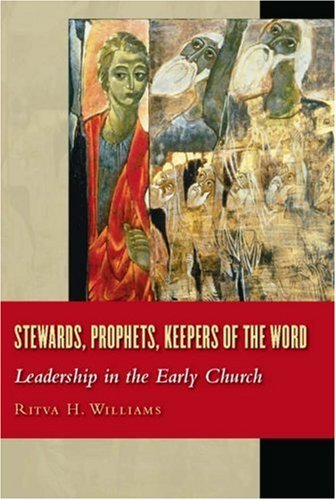Ritva Williams: Stewards, Prophets, Keepers of the Word
 Ritva H. Williams, Stewards, Prophets, Keepers of the Word: Leadership in the Early Church (Peabody, MA: Hendrickson, 2006), 228 pages, ISBN 9781565639492.
Ritva H. Williams, Stewards, Prophets, Keepers of the Word: Leadership in the Early Church (Peabody, MA: Hendrickson, 2006), 228 pages, ISBN 9781565639492.
Williams approaches the subject of leadership in the early church through an examination of the social and cultural customs of the Greco-Roman civilization during the first and second centuries. In addition to canonized and apocryphal scriptures, she has engaged early Church and public documents to support her research. Her scholarship follows the popular disciplines of Funk’s Jesus Seminar and her presuppositions follow Bultmann’s demythologization of the scripture, whereas her interpretation of scripture follows the historical-critical methodology.
There is much to recommend regarding this book’s discussion of stewards and prophets. First, Williams lays a foundation, describing the Greco-Roman patron-client social paradigm. She takes great effort to describe how the patron-client model is evident in the gospel narratives of Jesus and in the teaching and the plots of his parables. She added a valuable word study on “steward” (oikonomos) to specify how church leadership in the early centuries followed the social norm and role of the household steward. The primary strength of Williams’ thesis rests on the dynamic of the role of the steward (oikonomos) of the church. Additionally, Williams explores the Pauline idea of being in Christ as the exemplar of the steward who finds authority and security as the broker of his master’s household, wealth, and social status.
William’s conclusion is open-ended and she declines to “provide a blueprint for what it means to be a faithful steward, a true prophet, and/or a genuine keeper of the word.” An additional chapter that proposes an application would strengthen the book and satisfy its argument. In this, Williams demonstrated a postmodern ending to her research on leadership in the early Church. What is the role of the steward today? One can only speculate if the role of the steward is to be the role of the church leader or even a paradigm for denominational reformation.
Reviewed by John R. Miller
Preview this book: http://books.google.com/books?id=u1yJ5joHOcYC
Category: Church History, Fall 2009


